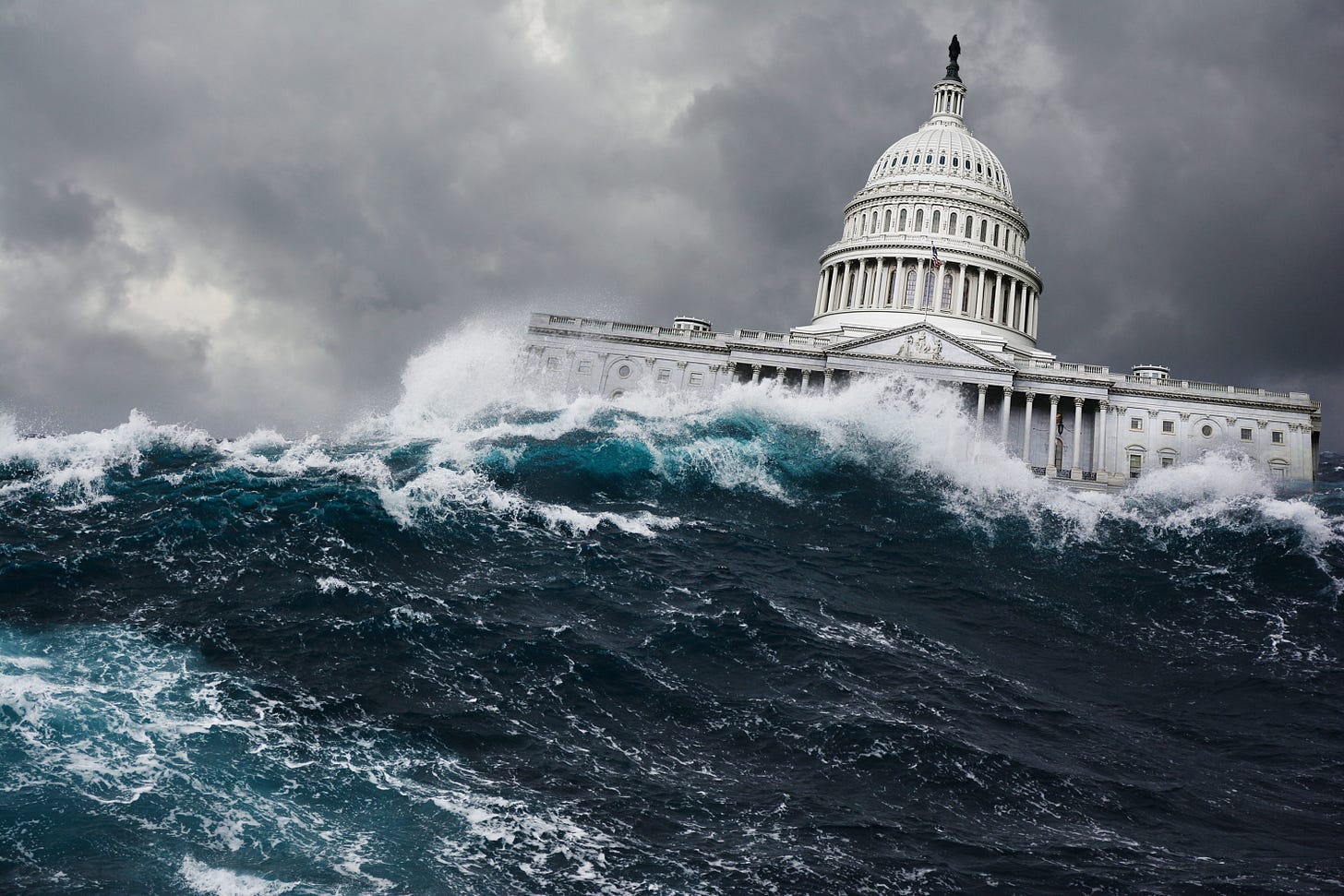Did We Forget Our Democracy Is Still Under Threat?
Complacency is an inherent weakness of democracy.

Old joke: An old fish and a young fish pass each other. The old fish says, “Fine water today, isn’t it?” The young fish replies, “What’s water?”
This, I have learned in hundreds of hours of focus groups, is how many Americans think about democracy—or more accurately, don’t think about it. Democracy is the system we have, and have inherited, but most of our experiences with any of the alternatives are so remote that we view democracy as the default state. As something that just is.
That isn’t to say that Americans don’t think about politics. Oh, do we. Probably more than is helpful. We have, as a people, some pretty out-there opinions and preferences and expectations about politics.
But mostly when we think about politics, we think about the results we want. These choices are often framed in terms of personalities. Certainly, this phenomenon isn’t limited to the United States: Jeremy Corbyn, Boris Johnson, Bibi Netanyahu, Emmanuel Macron—the list of personalities that more or less define political divides in democratic societies is long and diverse.
Sometimes the results we want are framed not as people, but as policies: higher taxes or lower taxes, more environmental regulation or less, strong national defense or retrenchment. Maybe having policy preferences is civically healthier than having preferences merely for certain individuals over others. Or maybe character is destiny and policy is transient, so choosing the better person is the way to go.
I’m not sure myself and your mileage may vary.
But either way, with all the time we spend thinking about politics, very little of it is devoted to the most important part of our liberal tradition: process.
This has not always been so. Lincoln appreciated that the greatest challenge to American democracy could also be “a new birth of freedom.” Keenly aware that the founding generation had died off in the 87 years between the Declaration of Independence and his address at Gettysburg, he called on the new generation of Americans “to be dedicated here to the unfinished work which they who fought here have thus far so nobly advanced.”
Subsequent presidents, in moments of crisis, echoed the sentiment. Woodrow Wilson called on Americans to “make the world safe for democracy.” In response to the Great Depression that triggered societal collapse in other countries, Franklin Roosevelt offered Americans a New Deal. With Harry Truman listening on, Winston Churchill (an honorary American) declared “a solemn moment for American Democracy” in his Iron Curtain speech. Ronald Reagan, in his farewell address, warned of waning passion for American democracy and called for a renewed “informed patriotism.” On the evening of September 11, 2001, George W. Bush first described the terrible attacks on “our way of life, our very freedom” before mentioning the “airplanes and offices.”
At such moments—moments when democracy was threatened, under siege, attacked, or rotten—presidents and statesmen have reminded the public that the preservation of democracy should always be our chief political aim.
As the Constitution puts it, to “secure the Blessings of Liberty to ourselves and our Posterity.”
Rallying Americans ’round the flag of democracy has never not worked.
And yet, this time feels different. Like our social media-soaked brains and collective attention deficit disorder won’t let us focus long enough to recognize—let alone work to resolve—the danger of the moment.
In a new essay, Olivia Troye explains in detail how great a threat to democracy the radicalized Republican party has become. Not quite four months ago, a mob of normal American citizens—driven by a lie concocted and spread by their elected leaders—succeeded in doing what neither Robert E. Lee nor Osama bin Laden ever could: sacking the Capitol and forcing the elected representatives of the American people in Congress into hiding.
We are, yet again, at a moment of democratic peril. Just because the siege of the Capitol on January 6 ultimately failed in its goal of overturning a free and fair election doesn’t mean the danger has passed. Our freedom and self-government are under threat from domestic authoritarian cults in tacit—if not enthusiastic—alliance with foreign despots who desire that the world’s oldest democracy succumb to corrupt populist autocracy.
Not quite four months ago, more than 140 members of Congress objected to counting the Electoral Votes of a free and fair election. Perhaps some of them are dim enough or deluded enough to believe that the votes were illegitimate. But if anything, that’s the best-case scenario. It’s even scarier that some members of this group knew that there was no legitimate reason to object to counting the votes, but voted to overturn the election anyway.
And yet, 12 weeks later, we’re debating corporate tax rates, Dr. Seuss, and trans bathroom access, like nothing ever happened.
American democracy is under attack. And not in a metaphorical, or a philosophical, or a spiritual sense.
Our democracy is under attack, for real, by a large portion of a major political party which seeks to utterly transform the relationship between the government and the governed.
It’s time we start acting like it.


